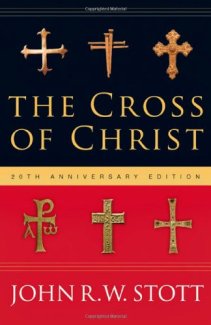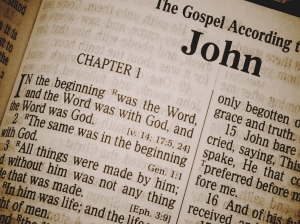
I can never express enough my gratitude to my FBC family for your support of me in seminary, both prayerfully and financially. Because of that, I try to share as much as possible from my experience there, and so today I wanted to post on here a book review I had to write recently for my systematic theology class. For those of you who have never read John Stott’s book The Cross of Christ, I can’t encourage you enough to check it out. Hopefully this review will give you just enough of the taste you need to pick it up and read one of the most influential and foundational works on evangelical theology to come out of the late twentieth century.
Stott, John R. W. The Cross of Christ. Downers Grove: Intervarsity Press, 1986. 380 pp.
Introduction
John Stott’s Cross of Christ has stood for close to three decades as one of the author’s defining works and a solid expansion of basic evangelical views regarding Christ’s crucifixion. Stott was an evangelical Anglican cleric who served the church for over sixty years as curate, rector, and rector emeritus of All Souls Church, Langham Place in London. Stott was highly influential in leading evangelicals to remain within the Anglican Church, and his influence among evangelical Christians spread across the globe. His bibliography contains over fifty different books on a wide range of theological topics. Stott was known for his deep theological insights and his ability to explain such lofty concepts in simple, understandable terms.
The Cross of Christ is Stott’s attempt to demonstrate the central importance of Jesus’ crucifixion in understanding Christian theology. He seeks to place the cross at the center of all Christian doctrine and from there extricate its role in the totality of Christian life. From God’s relationship with man to man’s relationship with one another, the cross stands firm as a lasting symbol of the depth of Christianity. Christ’s crucifixion plays into every aspect of faith, and as such should be consistently commemorated and refocused upon. In this, Stott takes on a tall task by laying his scope upon the cross from its tiniest minutiae to its grandest implications for the follower of Christ.
Summary
Stott’s work is broken down into 4 broad sections, which he has titled “Approaching the Cross,” “The Heart of the Cross,” “The Achievement of the Cross,” and “Living under the Cross.” The first section looks at the centrality of the cross to Christianity; why is the cross even important to begin with? The rest of the section looks at the events leading up to the cross, how even though Jesus was physically handed over by the hands of men, he still willingly gave himself up to die according to the Father’s plan. From this, Stott observed a number of smaller implications taken from various things Jesus said before and during the passion events, centering on the depth and seriousness of human sin.
Section two moves from preliminary matters to the theological depth of why exactly Christ had to die upon the cross. Chapter four examines the apparent contradiction between God’s holiness and his ability to cleanly forgive the abject deplorability that is sin. Stott then turns to look at various theories of satisfaction proposed concerning the cross. Ultimately he lands on the concept of God’s self-satisfaction through display of his holy love. By sending Christ to the cross, both God’s condemnation of sin and his self-giving love were on display. Chapter six looks at Christ’s self-substitution in man’s place upon the cross and how it worked to bring about God’s satisfaction and man’s forgiveness.
Stott’s third section moves from the actions of the cross to their theological ramifications for the state of humanity. Possibly one of the most clarifying sections in the work, chapter seven looks at the aspects of salvation accomplished in the life of the believer. Specifically, Stott puts a magnifying glass over the terms propitiation, redemption, justification, and reconciliation to see their true meaning for the believer in light of the cross. He connects this back to the previous section by noting how Christ’s substitution underwrites all these aspects of salvation. Next, Stott looks at the revelatory nature of the cross and how through Christ’s sacrifice the full love of God has been revealed. Finally, he looks at the theme of victory in Jesus—how Christ’s death won the battle over the devil and evil and how that victory is worked out both in the world and in the hearts of men.
Stott finishes his work with practicality by observing how exactly the truths of the cross show themselves through the actions of the Christian community and the lives of its members. Chapter ten looks specifically at the idea of celebration within the church and moves from a discussion on the newfound attitudes of celebration to a discussion on the depths of communion. Chapter eleven sees takes these new attitudes and applies them to self-worth and personal identity in Christ. He enumerates the many ways Christians should deny their old nature, embrace their new identity, and ultimately shine forth Christ’s self-sacrificial, giving love in this world. Chapter twelve moves out of self-sacrificial love towards loving one’s enemies and seeking to overcome evil with good. Finally, Stott closes the book with a number of views on the classic problem of evil, or suffering as he calls it. He enumerates a handful of ways that suffering in the Christian life falls in line with God’s character on the cross and how it can be ultimately edifying to the follower of Christ.
Analysis
It should be noted from the outset that the scope of Stott’s undertaking in this work is simply monumental. To take a subject so central, so foundational to the Christian faith and attack it from every direction requires a boldness that Stott certainly brings. Of course, for this reason, The Cross of Christ has been widely accepted as a deeply influential work since its penning nearly thirty years ago. Stott does a thorough job of looking at the entirety of the cross and its role in Christianity. By explicating the scriptural milieu leading up to the cross, Stott forms the basis for his theology. By delving into the depths why Jesus had to die, he uncovers solid truths of God’s nature and ability to forgive and reconcile sinners. By uncovering the theological realities brought about in the cross, he fills out the picture of man’s new life in Christ. And by ultimately elucidating the practical effects of the crucifixion on the Christian life, he lays a solid path down which a believer can travel with all this newfound insight.
As for his apparent thesis, Stott certainly fulfills expectations and then some. He lays out simply the centrality of the crucifixion to Christian theology and then explains its roles in all of Christian faith. The doctrine of substitutionary atonement has been criticized from all directions, but Stott stands here waving its flag with his feet planted firmly on biblical and logical grounds. His whole work makes a well-defined logical progression from the biblical bases to God’s problem of forgiveness to the actual accomplished work of Christ to finally how it all works out in the Christian life. The fact that some thirty years after its composition, The Cross of Christ is still lauded as a thorough and foundational exposition on the doctrine of the cross proves its value both to the academic and the ecclesiological worlds.
One of the most glaring aspects of this work is the amount of John Stott’s personality put into its composition. Every chapter seemingly reveals a tinge more of who John Stott really was, from his intellectual stature to his pastoral nature. First, it is important to recognize the logic written into this work. Both on the grandest and smallest scales, Stott manages to keep his arguments logical and straightforward. No matter the topic, Stott keeps things in tidy order, so that the most important ideas are put forth as the most important over secondary issues. Primary, secondary, and even tertiary issues are certainly addressed, but Stott makes sure to keep them in their rightful series. One extremely helpful aspect of Stott’s logical nature shone through in his use of sequencing words to begin paragraphs listed in the same vein. When Stott begins a thought, he will introduce it and list how many sub-thoughts fall under it. Then, the following paragraphs tend to begin with proper sequencing language. For example, in discussing the biblical idea of propitiation, he notes it is “necessary to distinguish it from pagan ideas at three crucial points” (171). He then goes on to begin the following paragraphs with the main three points: “First, the reason why propitiation is necessary is that sin arouses the wrath of God…Second, who makes the propitiation…Third, what was the propitiatory sacrifice?” (171-172). By writing in this logical manner, Stott makes his arguments simple to follow and easy to review. This is enhanced by the inclusion of a study guide along in order to facilitate proper learning and internalization of the material even for laypeople without high theological training.
This final idea—that Stott greatly cares for the average reader and wants him or her to truly grasp the material—speaks to another aspect of Stott’s character. John Stott was a deeply intellectual man, for certain, but he was also a well known pastoral figure with a heart for people. Stott cared about his readers and that shows in his writing style. Instead of purposeful density of language, Stott states things clearly and concisely in order to better be consumed and absorbed by all. He utilizes imagery to its fullest in his explanation of theological principles. To use an example from the same chapter on different aspects of Christ’s salvation for sinners: each topic (propitiation, redemption, justification, and reconciliation) he connects with the proper intellectual setting. Propitiation pictures a temple surrounding, redemption a marketplace, justification a court of law, and reconciliation a personal home. Through each of these images, Stott lays out a perfectly understandable idea and picture of what exactly Christ has accomplished.
Another aspect to consider that shines through Stott’s writing is his own personal background. As an evangelical Anglican minister, Stott has some views that maybe do not totally mesh with the average protestant evangelical. This comes through especially in his chapter on Christian community and celebration, where he spends a significant portion of the chapter discussing the theological foundations for and views of the Eucharist. Of course an Anglican and a Southern Baptist are not going to totally see eye to eye, but Stott focuses a significant portion of his words in this regard to looking at the confluence of Anglican and Roman Catholic views on communion. This certainly made for an interesting discussion, but was perhaps less practical in nature.
Ministry Relevance
It seems as though this should go without saying, but the cross of Christ and the self-sacrificial, self-substitutionary atonement acquired therein are relevant to every aspect of Gospel ministry, since the cross is absolutely foundational to the Gospel message itself. As Paul plainly says in his first letter to the Corinthians, “We preach Christ crucified” (1 Cor 1:23). Every message we teach should revolve around that biblical truth and its implications for the lives of believers. This goes doubly so for my particular area of ministry—to youth—where so many messages cry for their attention and say their worth is found in other student’s opinions, their ability to perform on a sports field, how attractive they are, etc. Those societal pressures combine with a plethora of ministries that replace the deep truths of the gospel with fun, games, and a list of moral rules to follow and the result is an age group in significant need of the gospel, in a crucial time period of life, and with a lack of gospel witness. Thus, in youth ministry especially there is imperative need to focus on the cross of Christ and its teachings for students.
Conclusion
On the whole, Stott’s work stands up to the praise and respect hurled at it by the evangelical community. It takes a comprehensive look at the salvatory work of Christ and the implications the nature of Christ’s crucifixion has on Christian Theology. Stott’s work covers a wide range of topics, from why it had to happen in such a way, to what the cross reveals about God himself, to how the cross should play into everyday life for the Christian. His writing is clear and understandable yet still holds to the weight and depth of the topics he covers. There is certainly reason for the high praise it has received.
I personally would absolutely recommend the book to others, for it provides a detailed look at such a basic yet integral doctrine of Christianity. For those who have no taste for intellectual theology, Stott writes in a way that is fairly accessible. For those who look for theological discussion on the highest level, Stott refuses to back down from tough topics and hard thoughts. He truly encompasses what the cross is about and how Christ’s work on it greatly affects the lives of every human. The cross, the whole cross, and nothing but the cross of Christ rings forth as Stott’s call to arms; let every Christian hear and proclaim the glories of Christ and his self-sacrificial, self-substitutionary atonement.































